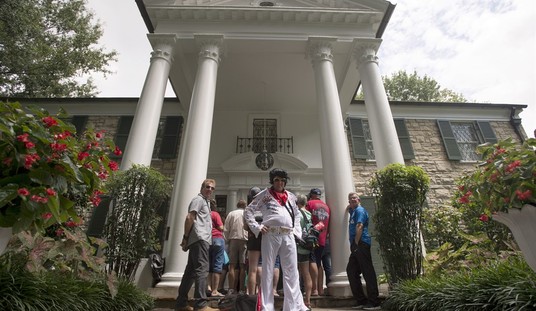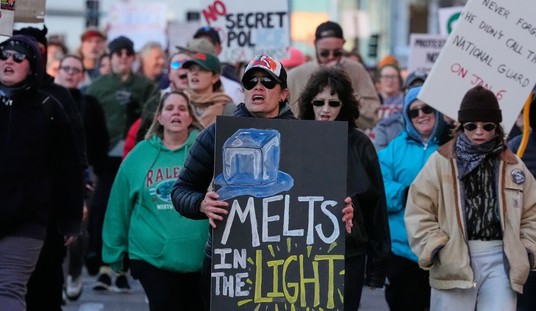Secret subpoenas. Police raids on consultants holding records of political groups. Suspects kept from contacting attorneys. Federal judge Rudolph Randa brought all this to a screeching halt in Wisconsin yesterday with a sweeping order ending the “John Doe” probe into the recall election of Governor Scott Walker. “This cannot square with the First Amendment.” Randa said of the investigation, and perhaps a few other clauses in the US Constitution as well:
A federal judge ordered a halt to the controversial John Doe investigation into campaign spending and fundraising by Gov. Scott Walker’s campaign and other conservative groups during the high-profile recall elections.
U.S. District Judge Rudolph Randa issued the 26-page decision late Tuesday, calling on prosecutors to immediately stop the long-running, five-county probe into possible illegal coordination among the various groups during 2011 and 2012.
“The Defendants must cease all activities related to the investigation, return all property seized in the investigation from any individual or organization, and permanently destroy all copies of information and other materials obtained through the investigation,” Randa wrote.
“Plaintiffs and others are herby relieved of any and every duty under Wisconsin law to cooperate further with Defendants’ investigation,” he wrote.
Randa revealed some aspects of the investigation in his order that had remained secret. One might wonder how the prosecutors in this case could have defended these tactics at all:
“Sheriff deputy vehicles used bright floodlights to illuminate the targets’ homes,” Randa wrote. “Deputies executed the search warrants, seizing business papers, computer equipment, phones, and other devices, while their targets were restrained under police supervision and denied the ability to contact their attorneys.
“Among the materials seized were many of the Club’s records that were in the possession of Ms. Jordahl and Mr. Johnson,” Randa continued. “The warrants indicate that they were executed at the request of (state Government Accountability Board) investigator Dean Nickel.”
Randa also wrote on the same day that O’Keefe and others with Wisconsin Club for Growth received subpoenas to turn over the club’s records from March 1, 2009, until the present. The subpoenas were subject to a secrecy order.
Secret subpoenas … in a public corruption probe? Two political consultants restrained from contacting their attorneys while search warrants were executed for mundane records? One would question these tactics in a national-security or RICO investigation involving potentially violent criminals. To call this overkill is an understatement.
This seriously smacks of a police state, or at least the attempt to create one, in order to intimidate political opponents. Randa agreed, ending the probe. He also issued a warning about campaign-finance regulations and the way they enable these very intrusions on constitutional freedoms (citations removed):
One of these rights is the First Amendment right to speak freely, which ―has its fullest and most urgent application precisely to the conduct of campaigns for political office. The First Amendment is ―[p]remised on mistrust of governmental power, and its vigorous use assures that government of the people remains so. When government attempts to regulate the exercise of this constitutional right, through campaign finance laws or otherwise, the danger always exists that the high purpose of campaign regulation and its enforcement may conceal self-interest, and those regulated by the Constitution in turn become the regulators. …
Conversely, issue advocacy, which is enabled by what we can call ―issue advocacy money, is not subject to these limitations because it is viewed only one way, and that is as protected First Amendment speech. This is not a recognition that quid pro quo corruption is the only source of corruption in our political system or that issue advocacy money could not be used for some corrupting purpose. Rather, the larger danger is giving government an expanded role in uprooting all forms of perceived corruption which may result in corruption of the First Amendment itself. It
is a recognition that maximizing First Amendment freedom is a better way to deal with political corruption than allowing the seemingly corruptible to do so. As other histories tell us, attempts to purify the public square lead to places like the Guillotine and the Gulag.
The prosecutors plan to appeal this decision, but it’s going to be a rather large lift to get an appeals court to support secret subpoenas and restraint from counsel on the basis of independent-expenditure rule enforcement. From the reporting and from the opinion, it doesn’t appear that Judge Randa will be amenable to a stay, although the appeals court might be. This looks for the moment like a clear win for political freedom, and a stop on political intimidation by the fading former Wisconsin establishment.
Update: They’re not fading without a fight. As I expected, the prosecutors filed an emergency application for a stay with the appellate court. They argue that the federal judge lacks jurisdiction over an elected state official, which may be news to federal appeals courts in dealing with First Amendment cases.








Join the conversation as a VIP Member